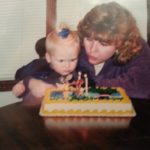Main Body
Introduction
The sun was hot on my back, the concrete scratching my knees beneath me. I remember how bright it was there, even with my eyes closed. I was not one hundred percent sure what was happening inside my house because my dad had sent me outside to wait for the ambulance, but I knew it was significant, so I dropped to my knees there on my driveway and prayed that God would fix everything and make it okay again. He did not. The ambulance came, but I cannot remember how long it took to get there. My aunt had shown up because she had been on the phone with my mom when her heart attack started. She hid around the corner of my house with me when they brought my mother out on the stretcher. She would just be in the hospital overnight, they said. They were wrong.
My mother died that day. I was nine years old and had just finished the third grade. My peers spent that summer splashing in the local swimming pools, playing with their friends, and riding their bikes around town. I spent my summer mourning the loss of the most important person in my entire world. My grief did not end when that summer did; it lasted through that next school year, and then the next, and then the next. By middle school, I knew that the loss of my mother would forever be a part of the woman I would become. On my high school graduation day, I had an undeniable urge to visit her grave. I almost cried there, just for a minute, in my bright blue cap and gown, but I knew I could not cry because it would mess up my make-up. There were expectations for this day and crying over my mother who had been dead for almost ten years was not one of those expectations.
For these past ten years, I have experienced much emotion, grief, and pain regarding my mother’s death. One night a summer or two ago, I was on Amazon looking for something to read about the grief of losing a mother. I found Hope Edelman’s Motherless Daughters (2006), which I proceeded to buy. I did not know it at the time, but this book would teach me that I am not alone in my experiences after the loss of my mother.
For most, the loss of a mother pains daughters unlike any other loss. “Motherless daughters,” as penned by Edelman, has become an epithet for this unique group of women. As those young women grow older, the effects of their childhood loss may impact them in surprising and unexpected ways. Based on the time of the mother’s death in the young woman’s childhood, the effects shift from confusion to identity development. Also, these women tend to see their loss impact their love life, their attitude toward motherhood, and their relationship with their own mortality changes. Additionally, a link between psychological disorders like anxiety and depression and early maternal loss has been studied. The death of a mother for a young woman goes on to impact her for the rest of her life, creating a legacy of grief, pain, and heartache.

